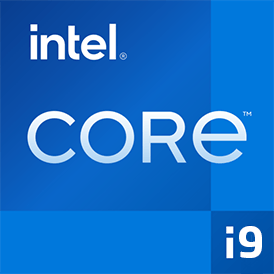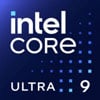
Intel Core i9-14900K Benchmark, Test and specs
Last updated:
The Intel Core i9-14900K was released in Q4/2023 and has 24 cores. The processor can process 32 threads simultaneously and uses a mainboard with the socket LGA 1700. In the Geekbench 5 benchmark, the Intel Core i9-14900K achieved a result of 2,412 points (single-core) or 26,972 points (multi-core).

| Name: | Intel Core i9-14900K |
|---|---|
| Family: | Intel Core i9 (78) |
| CPU group: | Intel Core i 14000 (23) |
| Architecture: | Raptor Lake S Refresh |
| Segment: | Desktop / Server |
| Generation: | 14 |
| Predecessor: | Intel Core i9-13900K |
| Successor: | -- |
CPU Cores and Base Frequency
The Intel Core i9-14900K has 24 cores. The clock frequency of the Intel Core i9-14900K is 3.20 GHz (6.00 GHz). An initial performance assessment can be made using the number of CPU cores.
| CPU Cores / Threads: | 24 / 32 |
|---|---|
| Core architecture: | hybrid (big.LITTLE) |
| A-Core: | 8x Raptor Cove |
| B-Core: | 16x Gracemont |
| Hyperthreading / SMT: | Yes |
|---|---|
| Overclocking: | Yes |
| A-Core Frequency: | 3.20 GHz (6.00 GHz) |
| B-Core Frequency: | 2.40 GHz (4.40 GHz) |
Internal Graphics
The Intel Core i9-14900K has an integrated graphics that the system can use to efficiently play back videos. The Intel Core i9-14900K has the Intel UHD Graphics 770 installed, which has 32 streaming multiprocessors (256 shaders).
| GPU name: | Intel UHD Graphics 770 |
|---|---|
| GPU frequency: | 0.30 GHz |
| GPU (Turbo): | 1.65 GHz |
| Compute units: | 32 |
| Shader: | 256 |
| Hardware Raytracing: | No |
| Release date: | Q4/2021 |
| Max. displays: | 3 |
|---|---|
| Generation: | 11 |
| Direct X: | 12 |
| Technology: | 10 nm |
| Max. GPU Memory: | 64 GB |
| Frame Generation: | No |
Hardware codec support
Processors with integrated graphics can process video codecs faster. Support for modern codecs can significantly increase system efficiency during video playback.
| h265 / HEVC (8 bit): | Decode / Encode |
|---|---|
| h265 / HEVC (10 bit): | Decode / Encode |
| h264: | Decode / Encode |
| VP8: | Decode / Encode |
| VP9: | Decode / Encode |
| AV1: | Decode |
|---|---|
| AVC: | Decode / Encode |
| VC-1: | Decode |
| JPEG: | Decode / Encode |
Memory & PCIeThe Intel Core i9-14900K supports a maximum of 192 GB memory. Depending on the mainboard, the processor can use a maximum of 2 (Dual Channel) memory channels. This results in a maximum bandwidth of the main memory of 89.6 GB/s. |
|
| Memory type: | Memory bandwidth: |
|---|---|
| DDR5-5600 DDR4-3200 | 89.6 GB/s 51.2 GB/s |
| Max. Memory: | 192 GB |
| Memory channels: | 2 (Dual Channel) |
| ECC: | Yes |
| PCIe: | 5.0 x 20 |
| PCIe Bandwidth: | 78.8 GB/s |
Thermal ManagementThe Intel Core i9-14900K has a TDP of 125 W. Based on the TDP, the system manufacturer can and must adapt the cooling solution to the processor. |
|
|---|---|
| TDP (PL1 / PBP): | 125 W |
| TDP (PL2): | 253 W |
| TDP up: | -- |
| TDP down: | -- |
| Tjunction max.: | 100 °C |
Technical details
Modern production reduces the waste heat of a processor and increases its efficiency. The Intel Core i9-14900K is made in 10 nm and has 68.00 MB cache.
| Technology: | 10 nm |
|---|---|
| Chip design: | Monolithic |
| Socket: | LGA 1700 |
| L2-Cache: | 32.00 MB |
| L3-Cache: | 36.00 MB |
| AES-NI: | Yes |
| Operating systems: | Windows 10, Windows 11, Linux |
| Virtualization: | VT-x, VT-x EPT, VT-d |
|---|---|
| Instruction set (ISA): | x86-64 (64 bit) |
| ISA extensions: | SSE4.1, SSE4.2, AVX2, AVX2+ |
| Release date: | Q4/2023 |
| Release price: | -- |
| Part Number: | -- |
| Documents: | Technical data sheet |
Rate this processor
Benchmark results

The benchmark results for the Intel Core i9-14900K have been carefully checked by us. We only publish benchmark results that have been created by us or that have been submitted by a visitor and then checked by a team member. All results are based on and fullfill our benchmark guidelines.
Screenshots:
Screenshots:
- Cinebench R23 (48 GB DDR5-6000), Windows 11 Pro [Intel Core i9-14900KF]
- CPU-Z (48 GB DDR5-6000), Windows 11 Pro [Intel Core i9-14900KF]
Cinebench 2024 (Single-Core)
The Cinebench 2024 benchmark is based on the Redshift rendering engine, which is also used in Maxon's 3D program Cinema 4D. The benchmark runs are each 10 minutes long to test whether the processor is limited by its heat generation.

|
Apple M3 Pro (12-CPU 18-GPU)
12C 12T @ 4.06 GHz |
||

|
Apple M3 Max (14-CPU 30-GPU)
14C 14T @ 4.06 GHz |
||

|
Apple M3 Max (16-CPU 40-GPU)
16C 16T @ 4.06 GHz |
||
|
|
Intel Core i9-14900K
24C 32T @ 6.00 GHz |
||

|
Apple M3 Pro (11-CPU 14-GPU)
11C 11T @ 4.06 GHz |
||

|
Intel Core i9-14900KF
24C 32T @ 6.00 GHz |
||

|
Apple M3 (8-GPU)
8C 8T @ 4.06 GHz |
||
Cinebench 2024 (Multi-Core)
The Multi-Core test of the Cinebench 2024 benchmark uses all cpu cores to render using the Redshift rendering engine, which is also used in Maxons Cinema 4D. The benchmark run is 10 minutes long to test whether the processor is limited by its heat generation.

|
AMD Ryzen Threadripper PRO 3975WX
32C 64T @ 4.20 GHz |
||

|
AMD Ryzen Threadripper PRO 5965WX
24C 48T @ 4.50 GHz |
||

|
Intel Core i9-14900KS
24C 32T @ 6.20 GHz |
||
|
|
Intel Core i9-14900K
24C 32T @ 6.00 GHz |
||

|
Intel Core i9-14900KF
24C 32T @ 6.00 GHz |
||

|
Intel Core i9-13900KS
24C 32T @ 6.00 GHz |
||

|
Intel Core i9-13900KF
24C 32T @ 5.80 GHz |
||
Cinebench R23 (Single-Core)
Cinebench R23 is the successor of Cinebench R20 and is also based on the Cinema 4 Suite. Cinema 4 is a worldwide used software to create 3D forms. The single-core test only uses one CPU core, the amount of cores or hyperthreading ability doesn't count.

|
Intel Core i9-14900KS
24C 32T @ 6.20 GHz |
||
|
|
Intel Core i9-14900K
24C 32T @ 6.00 GHz |
||

|
Intel Core i9-14900KF
24C 32T @ 6.00 GHz |
||

|
Intel Core i9-13900KS
24C 32T @ 6.00 GHz |
||

|
Intel Core i9-14900F
24C 32T @ 5.80 GHz |
||

|
Intel Core i9-14900
24C 32T @ 5.80 GHz |
||

|
Intel Core i9-13900KF
24C 32T @ 5.80 GHz |
||
Cinebench R23 (Multi-Core)
Cinebench R23 is the successor of Cinebench R20 and is also based on the Cinema 4 Suite. Cinema 4 is a worldwide used software to create 3D forms. The multi-core test involves all CPU cores and taks a big advantage of hyperthreading.

|
AMD Ryzen Threadripper PRO 5965WX
24C 48T @ 4.00 GHz |
||

|
Intel Core i9-13900K
24C 32T @ 5.50 GHz |
||

|
Intel Core i9-13900KF
24C 32T @ 5.50 GHz |
||
|
|
Intel Core i9-14900K
24C 32T @ 5.70 GHz |
||

|
Intel Core i9-14900KF
24C 32T @ 5.70 GHz |
||

|
AMD Ryzen 9 7950X
16C 32T @ 5.20 GHz |
||

|
AMD Ryzen 9 7950X3D
16C 32T @ 5.00 GHz |
||
Geekbench 5, 64bit (Single-Core)
Geekbench 5 is a cross plattform benchmark that heavily uses the systems memory. A fast memory will push the result a lot. The single-core test only uses one CPU core, the amount of cores or hyperthreading ability doesn't count.

|
Intel Core i9-14900KS
24C 32T @ 6.20 GHz |
||
|
|
Intel Core i9-14900K
24C 32T @ 6.00 GHz |
||

|
Intel Core i9-14900KF
24C 32T @ 6.00 GHz |
||

|
Apple M3 Pro (12-CPU 18-GPU)
12C 12T @ 4.06 GHz |
||

|
Apple M3 Pro (11-CPU 14-GPU)
11C 11T @ 4.06 GHz |
||

|
AMD Ryzen 9 7950X
16C 32T @ 5.70 GHz |
||

|
AMD Ryzen 9 7900X3D
12C 24T @ 5.60 GHz |
||
Geekbench 5, 64bit (Multi-Core)
Geekbench 5 is a cross plattform benchmark that heavily uses the systems memory. A fast memory will push the result a lot. The multi-core test involves all CPU cores and taks a big advantage of hyperthreading.

|
Apple M2 Ultra (60-GPU)
24C 24T @ 3.50 GHz |
||

|
Apple M2 Ultra (76-GPU)
24C 24T @ 3.50 GHz |
||

|
Intel Xeon W-3375
38C 72T @ 3.20 GHz |
||
|
|
Intel Core i9-14900K
24C 32T @ 5.70 GHz |
||

|
Intel Core i9-14900KF
24C 32T @ 5.70 GHz |
||

|
Intel Xeon Gold 6314U
32C 64T @ 2.70 GHz |
||

|
AMD EPYC 7542
32C 64T @ 3.20 GHz |
||
Geekbench 6 (Single-Core)
Geekbench 6 is a benchmark for modern computers, notebooks and smartphones. What is new is an optimized utilization of newer CPU architectures, e.g. based on the big.LITTLE concept and combining CPU cores of different sizes. The single-core benchmark only evaluates the performance of the fastest CPU core, the number of CPU cores in a processor is irrelevant here.

|
Intel Core i9-14900KS
24C 32T @ 6.20 GHz |
||
|
|
Intel Core i9-14900K
24C 32T @ 6.00 GHz |
||

|
Intel Core i9-14900KF
24C 32T @ 6.00 GHz |
||

|
Qualcomm Snapdragon X Elite (X1E-84-100)
12C 12T @ 4.20 GHzNot verified |
||

|
Apple M3 Pro (12-CPU 18-GPU)
12C 12T @ 4.06 GHz |
||

|
Apple M3 Max (16-CPU 40-GPU)
16C 16T @ 4.06 GHz |
||

|
Apple M3 (8-GPU)
8C 8T @ 4.06 GHz |
||
Geekbench 6 (Multi-Core)
Geekbench 6 is a benchmark for modern computers, notebooks and smartphones. What is new is an optimized utilization of newer CPU architectures, e.g. based on the big.LITTLE concept and combining CPU cores of different sizes. The multi-core benchmark evaluates the performance of all of the processor's CPU cores. Virtual thread improvements such as AMD SMT or Intel's Hyper-Threading have a positive impact on the benchmark result.

|
AMD Ryzen Threadripper PRO 7965WX
24C 48T @ 4.20 GHz |
||

|
AMD EPYC 9654
96C 192T @ 3.55 GHz |
||

|
AMD EPYC 9654P
96C 192T @ 3.55 GHz |
||
|
|
Intel Core i9-14900K
24C 32T @ 5.70 GHz |
||

|
Intel Core i9-14900KF
24C 32T @ 5.70 GHz |
||

|
Apple M2 Ultra (76-GPU)
24C 24T @ 3.50 GHz |
||

|
Apple M2 Ultra (60-GPU)
24C 24T @ 3.50 GHz |
||
iGPU - FP32 Performance (Single-precision GFLOPS)
The theoretical computing performance of the internal graphics unit of the processor with simple accuracy (32 bit) in GFLOPS. GFLOPS indicates how many billion floating point operations the iGPU can perform per second.

|
Intel Core i3-12300HE
Intel UHD Graphics 12th Gen (48 EU) @ 1.15 GHz |
||

|
Intel Core i3-12300HL
Intel UHD Graphics 12th Gen (48 EU) @ 1.15 GHz |
||

|
Intel Core i7-4770R
Intel Iris Pro Graphics 5200 @ 1.35 GHz |
||
|
|
Intel Core i9-14900K
Intel UHD Graphics 770 @ 1.65 GHz |
||

|
Intel Core i9-14900KS
Intel UHD Graphics 770 @ 1.65 GHz |
||

|
Intel Core i9-14900T
Intel UHD Graphics 770 @ 1.65 GHz |
||

|
Intel Core i9-14900
Intel UHD Graphics 770 @ 1.65 GHz |
||
Estimated results for PassMark CPU Mark
Some of the CPUs listed below have been benchmarked by CPU-monkey. However the majority of CPUs have not been tested and the results have been estimated by a CPU-monkey’s secret proprietary formula. As such they do not accurately reflect the actual Passmark CPU mark values and are not endorsed by PassMark Software Pty Ltd.

|
AMD EPYC 7642
48C 96T @ 2.80 GHz |
||

|
AMD EPYC 74F3
24C 48T @ 3.80 GHz |
||

|
AMD EPYC 7513
32C 64T @ 3.20 GHz |
||
|
|
Intel Core i9-14900K
24C 32T @ 5.70 GHz |
||

|
Intel Core i9-14900KF
24C 32T @ 5.70 GHz |
||

|
Intel Core i9-13900KF
24C 32T @ 5.50 GHz |
||

|
Intel Core i9-13900K
24C 32T @ 5.50 GHz |
||
CPU performance per watt (efficiency)
Efficiency of the processor under full load in the Cinebench R23 (multi-core) benchmark. The benchmark result is divided by the average energy required (CPU package power in watts). The higher the value, the more efficient the CPU is under full load.

|
Intel Core i5-12600KF
17,660 CB R23 MC @ 115 W |
||

|
Intel Core i5-12400
12,454 CB R23 MC @ 82 W |
||

|
Intel Core i5-12400F
12,454 CB R23 MC @ 82 W |
||
|
|
Intel Core i9-14900K
38,712 CB R23 MC @ 256 W |
||

|
AMD Ryzen 5 7600X
15,315 CB R23 MC @ 103 W |
||

|
AMD Ryzen 5 5600X
10,988 CB R23 MC @ 76 W |
||

|
Intel Core i5-13500
21,216 CB R23 MC @ 147 W |
||
Benchmarks

Cinebench 2024 (SC)
272 entries
272 entries

Cinebench 2024 (MC)
271 entries
271 entries

Cinebench R23 (SC)
586 entries
586 entries

Cinebench R23 (MC)
565 entries
565 entries

Geekbench 5 (SC)
2,488 entries
2,488 entries

Geekbench 5 (MC)
2,461 entries
2,461 entries

Geekbench 6 (SC)
1,755 entries
1,755 entries

Geekbench 6 (MC)
1,703 entries
1,703 entries

FP32 SP (iGPU)
2,042 entries
2,042 entries

3DMark Timespy (iGPU)
516 entries
516 entries

PassMark CPU-Mark
2,392 entries
2,392 entries

CPU performance per watt (efficiency)
109 entries
109 entries
Description of the processor
The Intel Core i9-14900K comes from Intels only slightly improved "Raptor Lake Refresh" architecture. It has 8 P-cores (Raptor Cove) and 16 smaller E-cores (Gracemont). With this hybrid core structure, the processor has a total of 24 cores and 32 threads that can be processed simultaneously.Compared to the previous model, the Intel Core i9-13900K, Intel has only slightly increased the clock frequency by up to 200 MHz, which corresponds to a speed advantage of around 5 percent. Since neither architecture nor manufacturing processes have been improved, this additional performance comes at the cost of increased energy consumption.
This is also unfortunate in view of the already very poor energy efficiency. The TDP remains unchanged at 125 watts, although the PL2 of 253 watts can be maintained permanently with good cooling. The Intel Core i9-14900K only achieves maximum performance at 253 watts. Operation beyond this is possible, but not sensible as the energy efficiency decreases rapidly above a TDP of 253 watts.
Nevertheless, the Intel Core i9-14900K is suitable for both games and demanding applications like no other processor. Up to 192 GB of DDR5-5600 memory can be managed by the processor. The maximum memory bandwidth for dual-channel DDR5-5600 is 89.6 GB/s.
The processor has 20 PCIe 5.0 lines with a bandwidth of 78.8 GB/s. Additional PCIe lines can be implemented via the respective mainboard chipset. A dedicated graphics card and a fast M.2 SSD can be connected directly to the Intel Core i9-14900K itself via PCIe 5.0 x16.
The Intel Core i9-14900K has 32 MB Level 2 cache and 36 MB Level 3 cache. The 14th generation of Intel Core i processors is the third and last to use the LGA 1700 socket.
Popular comparisons
back to index





